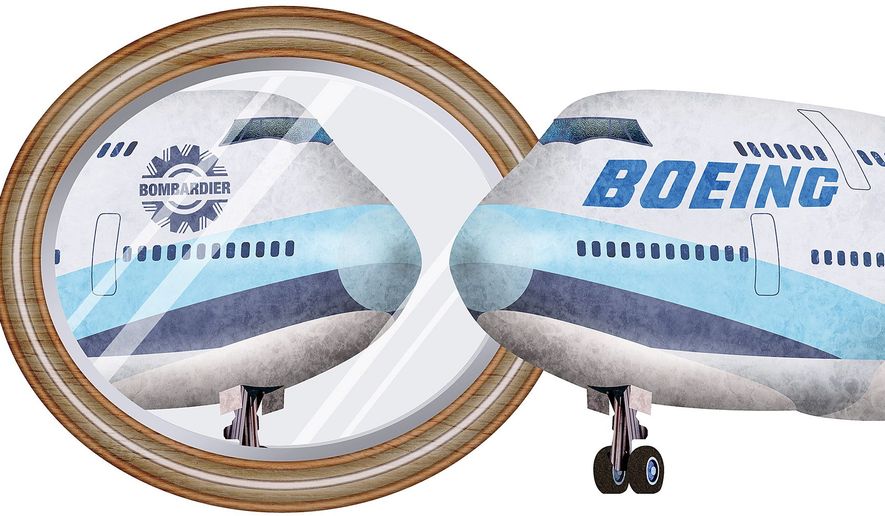OPINION:
In the most recent quarter, Boeing reported profits well-ahead of analysts’ expectations and increased its earnings projections for the full year. A large part of the profit was generated by record-high production rates on the 737 aircraft, and about a $530 million cash injection from 787 orders.
In the same quarter, Boeing filed a formal complaint with the U.S. International Trade Commission and the Department of Commerce alleging two things: First that its 737 aircraft program was under threat by Bombardier’s new C Series aircraft; and second that Bombardier is selling the C Series below its production cost into the U.S. market.
Boeing’s claims however, are not supported by the facts, as many industry experts have pointed out, the C Series and 737 really don’t compete. Moreover, a new report shows that Boeing’s own pricing strategy for the 787 was exactly the same strategy employed by Bombardier for the C Series. Simply put, Boeing’s argument represents the biggest case of hypocrisy in the history of the aviation business.
Opposition is mounting from government leaders and others. United Kingdom Prime Minister Theresa May called President Donald Trump to voice her concern about the impact this decision could have on Bombardier’s jobs in Northern Ireland. Not only would this impact Northern Ireland, but jobs and economic activity in the United States. More than half of the value of each C Series aircraft is from American-based companies. This venture represents more than $30 billion of domestic economic activity, with 22,000 jobs created in supported across 17 states.
This is exactly why members of Congress from Kansas and West Virginia recently penned a letter to the U.S. Department of Commerce and the U.S. International Trade Commission noting Bombardier’s investment in jobs and manufacturing in the United States. Sens. Shelley Moore Capito, Joe Manchin, Jerry Moran and Pat Roberts signed the letter with Reps. Ron Estes and David McKinley. They don’t stand alone. Suppliers, airlines, consumer groups, trade experts and many others have also voiced concerns.
This will hurt all non-Boeing jobs and interests.
The central point of Boeing’s claim against Bombardier, is that Bombardier engaged in unfair competition by offering launch pricing; selling the C Series below cost for early customers. Boeing apparently is hoping that the ITC and Department of Commerce don’t figure out that this is the industry norm for new, clean-sheet aircraft programs, and that Boeing itself engages in the very same practice.
In its formal complaint, Boeing relied heavily on the work of the Leeham Co., an aerospace and aviation consultancy specializing in aircraft program accounting to illustrate Bombardier’s launch pricing for the C Series. It now appears that Boeing’s own pricing practices are attracting more attention, as the same Leeham Co. recently published a report on the 787 — Boeing’s latest clean-sheet program. The report shows conclusively that Boeing is “guilty” of the very same launch pricing practices it now complains about.
So according to Boeing, it is perfectly okay to sell several hundred 787 below their production cost, including 16 aircraft to Air Canada in Bombardier’s home market. But, if anyone else does; they are engaging in unfair trade practices.
You may ask, why do aircraft manufacturers engage in this seemingly unusual commercial behavior? One reason is that early customers of a new aircraft program take on greater risk than those buying later-built units. The 787 is a textbook example. There were multiyear and multi-billion dollar delays. Early customers dealt with a litany of mechanical and electrical issues following the entry-into-service of the 787 including fleet groundings, battery fires and other issues.
So why would Boeing file such an unprincipled complaint against Bombardier, and why now? The why is straightforward: the complaint is a chance to crush a potential future competitor with the blunt instrument of U.S. trade law. Even though Bombardier doesn’t today have a competing aircraft, Boeing thinks they might one day.
As for the why now — since the C Series order from Delta Air Lines was announced in the spring of 2016 — the answer may lie in the current political climate. In the broader context of North American trade renegotiation, the political atmosphere seems to have overshadowed the hard facts of aircraft pricing. Boeing’s complaint comes at a sensitive time within a window of NAFTA renegotiation. U.S.-Canada-Mexico trade has received more attention than it has in decades.
Adding irony to the NAFTA argument is the fact that more than 55 percent of the C Series’ components are sourced from U.S.-based suppliers. So it really isn’t about U.S. jobs. The C Series supports thousands of them. It is about a very large and successful company seizing the political opportunity to try to drive a potential future competitor out of the market.
Boeing’s complaint is discouraging to both analysts and consumers. Not only does the complaint refuse to acknowledge the fact that Boeing does not compete within the same market segment that Bombardier is attempting to enter with the C Series, but it also seeks to punish Bombardier for engaging in precisely the same pricing practices it uses itself. Moreover, it seeks to quash the spirit of innovation Bombardier has shown in its attempt to meet a need requested by consumers: short haul capacity for point to point routes.
If Boeing is looking to place the blame for Bombardier’s recent successful launch of a new aircraft, they should look no further than the mirror.
• Darryl Jenkins is an airline analyst with more than 30 years of experience in the aviation industry.




Please read our comment policy before commenting.